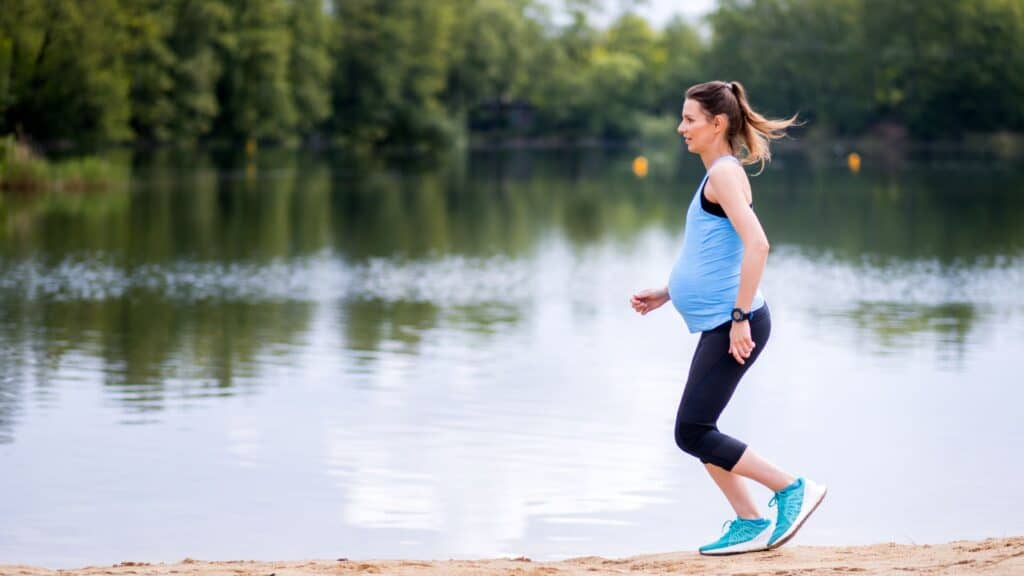Pregnancy marks a significant chapter in a woman’s life, accompanied by various changes, including questions about physical fitness.
Expectant mothers often wonder if they can continue their exercise routines safely.
While individual medical advice is essential, this article provides a comprehensive overview of staying active during pregnancy.
Exercise can offer numerous advantages during pregnancy, such as enhanced mood, reduced discomfort, and improved stamina for labor and delivery. Additionally, regular physical activity can help in managing weight gain, reducing the risk of gestational diabetes, and improving overall cardiovascular health.
However, it’s crucial to exercise safely and adapt your routine to accommodate the body’s changes.

Consulting a Healthcare Provider
Before continuing or starting an exercise regimen during pregnancy, it’s imperative to consult with a healthcare provider.
They can offer personalized guidance based on your medical history and specific circumstances. Your healthcare provider can evaluate your overall health and provide recommendations on the type, frequency, and intensity of exercise that is safe for you and your baby.
Adapting Your Pre-Pregnancy Routine
It’s generally safer for expectant mothers to continue exercises they were accustomed to before pregnancy.
Familiarity with the routines can ease adaptation as pregnancy progresses. However, it’s essential to make necessary adjustments to accommodate the changing body. For example, if you were a runner, you might switch to brisk walking or jogging, which is gentler on the joints.
Listening to Your Body
Pregnancy often brings fatigue and discomfort. Pay close attention to your body during exercise. If you experience pain, dizziness, or shortness of breath, stop immediately. It’s perfectly acceptable to take breaks, modify exercises, or reduce the duration of your workouts to ensure your comfort and safety.
Staying Hydrated
Proper hydration is essential during pregnancy, especially when exercising. Dehydration can lead to overheating and complications.
Drink water regularly before, during, and after workouts. Carry a reusable water bottle to remind yourself to stay adequately hydrated throughout the day.
Avoiding Overexertion
Pregnancy is not the time for pushing limits.
The goal should be maintaining fitness and well-being, not achieving peak performance. Overexertion can lead to exhaustion, potentially impacting your health and the health of your baby. Listen to your body’s signals and be mindful of your exertion levels.
Adjusting Training Intensity
As pregnancy progresses, lower the intensity of your workouts as needed for comfort and safety. Your body will naturally undergo changes to accommodate your growing baby, which may affect your balance and energy levels. Consider switching to gentler forms of exercise, like prenatal yoga or swimming, which can provide excellent benefits with reduced impact.
Choosing Low-Impact Activities
Opt for low-impact exercises like swimming, walking, stationary cycling, and prenatal yoga. These activities help maintain fitness while minimizing injury risk. Low-impact workouts are gentle on your joints and reduce the risk of strains and sprains, which can be more common during pregnancy due to hormonal changes affecting ligament stability.

Strength and Core Exercises
Incorporate strength training, focusing on core and pelvic floor muscles, to support your body during pregnancy and prepare for childbirth.
Consult with professionals, such as a certified prenatal fitness trainer or physical therapist, for guidance on safe and effective exercises. Strengthening these muscle groups can aid in maintaining posture, reducing back pain, and facilitating a smoother delivery.
Balanced Nutrition
Proper nutrition is vital, particularly during pregnancy and exercise. Ensure adequate calorie intake, a balanced diet, and appropriate supplementation.
Consult a registered dietitian or nutritionist who specializes in prenatal nutrition to develop a tailored eating plan that provides the necessary nutrients for both you and your growing baby.
Regular Check-Ups
Attend routine prenatal check-ups to monitor pregnancy progress and ensure the health of both you and your baby.
Discuss your exercise routine with your healthcare provider during these appointments to ensure that you are on track and not encountering any complications related to physical activity.
Pregnancy is a unique journey, and fitness goals should align with this transformative period. Staying active can promote physical and mental well-being, making the pregnancy experience more comfortable and enjoyable.
Safety should always be the top priority.



Comments are closed.